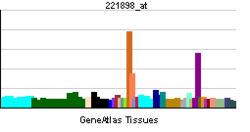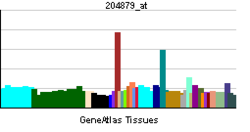- PDPN
-
Podoplanin is a protein that in humans is encoded by the PDPN gene.[1][2][3]
This gene encodes a type-I integral membrane glycoprotein with diverse distribution in human tissues. The physiological function of this protein may be related to its mucin-type character. The homologous protein in other species has been described as a differentiation antigen and influenza-virus receptor. The specific function of this protein has not been determined but it has been proposed as a marker of lung injury. Alternatively spliced transcript variants encoding different isoforms have been identified.[3]
References
- ^ Zimmer G, Oeffner F, Von Messling V, Tschernig T, Groness HJ, Klenk HD, Herrler G (Sep 1999). "Cloning and characterization of gp36, a human mucin-type glycoprotein preferentially expressed in vascular endothelium". Biochem J 341 ( Pt 2) (Pt 2): 277–84. PMC 1220357. PMID 10393083. http://www.pubmedcentral.nih.gov/articlerender.fcgi?tool=pmcentrez&artid=1220357.
- ^ Ma T, Yang B, Matthay MA, Verkman AS (Jul 1998). "Evidence against a role of mouse, rat, and two cloned human t1alpha isoforms as a water channel or a regulator of aquaporin-type water channels". Am J Respir Cell Mol Biol 19 (1): 143–9. PMID 9651190.
- ^ a b "Entrez Gene: PDPN podoplanin". http://www.ncbi.nlm.nih.gov/sites/entrez?Db=gene&Cmd=ShowDetailView&TermToSearch=10630.
Further reading
- Wicki A, Christofori G (2007). "The potential role of podoplanin in tumour invasion". Br. J. Cancer 96 (1): 1–5. doi:10.1038/sj.bjc.6603518. PMC 2360213. PMID 17179989. http://www.pubmedcentral.nih.gov/articlerender.fcgi?tool=pmcentrez&artid=2360213.
- Robertson NG, Khetarpal U, Gutiérrez-Espeleta GA, et al. (1995). "Isolation of novel and known genes from a human fetal cochlear cDNA library using subtractive hybridization and differential screening". Genomics 23 (1): 42–50. doi:10.1006/geno.1994.1457. PMID 7829101.
- Cross SH, Charlton JA, Nan X, Bird AP (1994). "Purification of CpG islands using a methylated DNA binding column". Nat. Genet. 6 (3): 236–44. doi:10.1038/ng0394-236. PMID 8012384.
- Bonaldo MF, Lennon G, Soares MB (1997). "Normalization and subtraction: two approaches to facilitate gene discovery". Genome Res. 6 (9): 791–806. doi:10.1101/gr.6.9.791. PMID 8889548.
- Strausberg RL, Feingold EA, Grouse LH, et al. (2003). "Generation and initial analysis of more than 15,000 full-length human and mouse cDNA sequences". Proc. Natl. Acad. Sci. U.S.A. 99 (26): 16899–903. doi:10.1073/pnas.242603899. PMC 139241. PMID 12477932. http://www.pubmedcentral.nih.gov/articlerender.fcgi?tool=pmcentrez&artid=139241.
- Kato Y, Fujita N, Kunita A, et al. (2004). "Molecular identification of Aggrus/T1alpha as a platelet aggregation-inducing factor expressed in colorectal tumors". J. Biol. Chem. 278 (51): 51599–605. doi:10.1074/jbc.M309935200. PMID 14522983.
- Kaneko M, Kato Y, Kunita A, et al. (2004). "Functional sialylated O-glycan to platelet aggregation on Aggrus (T1alpha/Podoplanin) molecules expressed in Chinese hamster ovary cells". J. Biol. Chem. 279 (37): 38838–43. doi:10.1074/jbc.M407210200. PMID 15231832.
- Gerhard DS, Wagner L, Feingold EA, et al. (2004). "The Status, Quality, and Expansion of the NIH Full-Length cDNA Project: The Mammalian Gene Collection (MGC)". Genome Res. 14 (10B): 2121–7. doi:10.1101/gr.2596504. PMC 528928. PMID 15489334. http://www.pubmedcentral.nih.gov/articlerender.fcgi?tool=pmcentrez&artid=528928.
- Martín-Villar E, Scholl FG, Gamallo C, et al. (2005). "Characterization of human PA2.26 antigen (T1alpha-2, podoplanin), a small membrane mucin induced in oral squamous cell carcinomas". Int. J. Cancer 113 (6): 899–910. doi:10.1002/ijc.20656. PMID 15515019.
- Schacht V, Dadras SS, Johnson LA, et al. (2005). "Up-Regulation of the Lymphatic Marker Podoplanin, a Mucin-Type Transmembrane Glycoprotein, in Human Squamous Cell Carcinomas and Germ Cell Tumors". Am. J. Pathol. 166 (3): 913–21. doi:10.1016/S0002-9440(10)62311-5. PMC 1602360. PMID 15743802. http://www.pubmedcentral.nih.gov/articlerender.fcgi?tool=pmcentrez&artid=1602360.
- Otsuki T, Ota T, Nishikawa T, et al. (2007). "Signal sequence and keyword trap in silico for selection of full-length human cDNAs encoding secretion or membrane proteins from oligo-capped cDNA libraries". DNA Res. 12 (2): 117–26. doi:10.1093/dnares/12.2.117. PMID 16303743.
- Hultgård-Ekwall AK, Mayerl C, Rubin K, et al. (2006). "An Interstitial Network of Podoplanin-Expressing Cells in the Human Endolymphatic Duct". J. Assoc. Res. Otolaryngol. 7 (1): 38–47. doi:10.1007/s10162-005-0021-8. PMC 2504586. PMID 16408168. http://www.pubmedcentral.nih.gov/articlerender.fcgi?tool=pmcentrez&artid=2504586.
- Dumoff KL, Chu CS, Harris EE, et al. (2006). "Low podoplanin expression in pretreatment biopsy material predicts poor prognosis in advanced-stage squamous cell carcinoma of the uterine cervix treated by primary radiation". Mod. Pathol. 19 (5): 708–16. doi:10.1038/modpathol.3800580. PMID 16528371.
- Omachi T, Kawai Y, Mizuno R, et al. (2007). "Immunohistochemical demonstration of proliferating lymphatic vessels in colorectal carcinoma and its clinicopathological significance". Cancer Lett. 246 (1–2): 167–72. doi:10.1016/j.canlet.2006.02.013. PMID 16574316.
- Mishima K, Kato Y, Kaneko MK, et al. (2007). "Increased expression of podoplanin in malignant astrocytic tumors as a novel molecular marker of malignant progression". Acta Neuropathol. 111 (5): 483–8. doi:10.1007/s00401-006-0063-y. PMID 16596424.
- Wicki A, Lehembre F, Wick N, et al. (2006). "Tumor invasion in the absence of epithelial-mesenchymal transition: podoplanin-mediated remodeling of the actin cytoskeleton". Cancer Cell 9 (4): 261–72. doi:10.1016/j.ccr.2006.03.010. PMID 16616332.
- Gregory SG, Barlow KF, McLay KE, et al. (2006). "The DNA sequence and biological annotation of human chromosome 1". Nature 441 (7091): 315–21. doi:10.1038/nature04727. PMID 16710414.
- Mishima K, Kato Y, Kaneko MK, et al. (2007). "Podoplanin expression in primary central nervous system germ cell tumors: a useful histological marker for the diagnosis of germinoma". Acta Neuropathol. 111 (6): 563–8. doi:10.1007/s00401-006-0033-4. PMID 16718353.
Categories:- Human proteins
- Chromosome 1 gene stubs
Wikimedia Foundation. 2010.


